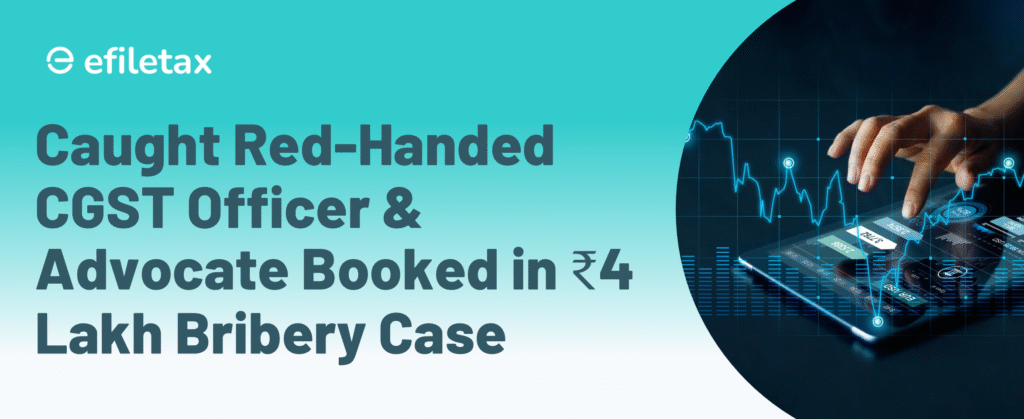
CGST Officer and Advocate Caught in ₹4 Lakh Bribery Case
In a recent CGST bribery case, a Central Goods and Services Tax officer and a tax advocate were arrested for allegedly demanding a ₹4 lakh bribe from a taxpayer for favorable action in a GST-related matter. This high-profile arrest has reignited discussions on corruption risks in tax administration and its impact on professionals and taxpayers alike.
What Happened in the CGST Bribery Case?
According to a press release by the Central Bureau of Investigation (CBI), the accused CGST officer demanded a bribe to resolve a GST registration issue. The tax advocate acted as a conduit in the transaction. Here’s a quick overview:
| Key Details | Information |
|---|---|
| Bribe Amount | ₹4,00,000 |
| Department Involved | CGST (Central GST Office) |
| Accused | Superintendent (CGST), Tax Advocate |
| Action Taken | Arrest by CBI under Prevention of Corruption Act |
🔗 Read CBI release for official confirmation (external link).
Legal Implications for the Tax Community
The Prevention of Corruption Act, 1988 applies to all public servants, including GST officers. Here’s how it affects professionals:
- Immediate Suspension of the CGST officer under CCS (CCA) Rules.
- Advocate’s arrest affects professional credibility under the Bar Council of India Rules.
- Section 120B IPC invoked for criminal conspiracy.
- CBIC Vigilance likely to initiate internal audits of related cases.
How Can Taxpayers Protect Themselves?
To stay compliant and avoid involvement in such cases:
- File returns on time and ensure proper documentation.
- Avoid cash dealings or informal negotiations with tax officials.
- Use registered tax practitioners or e-filing platforms like Efiletax.in.
- Record all communications related to assessments or notices.
- Report bribery attempts to CBI or CBIC vigilance portals.
Expert Tip: Always Escalate, Never Settle
“Even if your registration is wrongly cancelled or a demand is raised, never resort to informal deals. File replies on the GST portal, escalate to the Principal Commissioner, or file appeals through proper legal channels.”
— CA Gaurav Mehta, GST Consultant
Government Action on Similar Cases
In past bribery cases, the government has:
- Transferred officials involved in repeated misconduct.
- Issued advisories urging taxpayers to avoid unauthorized intermediaries.
- Enhanced GST backend audit trails to track officer logins and decisions.
These measures aim to curb corruption, though isolated cases still persist.
What This Case Means for GST Professionals
The case is a wake-up call for both taxpayers and GST consultants. It highlights:
- The risk of reputational damage even by association.
- Need for clear documentation and digital records.
- Importance of filing grievances or appeals rather than offering bribes.
FAQs on CGST Bribery Cases
Q1: Can a taxpayer be penalized for giving a bribe?
Yes, under Section 12 of the Prevention of Corruption Act, the giver of a bribe can also be prosecuted, unless they report it in time.
Q2: How can I report a bribery demand by a GST official?
You can report anonymously to the CBI Anti-Corruption Helpline or file a complaint on the CBIC vigilance portal.
Q3: Will this affect my GST registration or case?
If you were involved, possibly yes. If not, the government usually appoints another officer and ensures continuity in your case.
Summary
A CGST officer and tax advocate were arrested for demanding a ₹4 lakh bribe to resolve a GST registration issue. The case highlights legal risks under the Prevention of Corruption Act and serves as a warning to taxpayers and professionals about the consequences of informal tax dealings.
Final Word: Stay Transparent, Stay Protected
Bribery might seem like a shortcut in complex tax matters, but it often leads to long-term legal trouble. Platforms like Efiletax offer 100% transparent, compliant, and expert-led solutions to help you handle GST matters without fear.